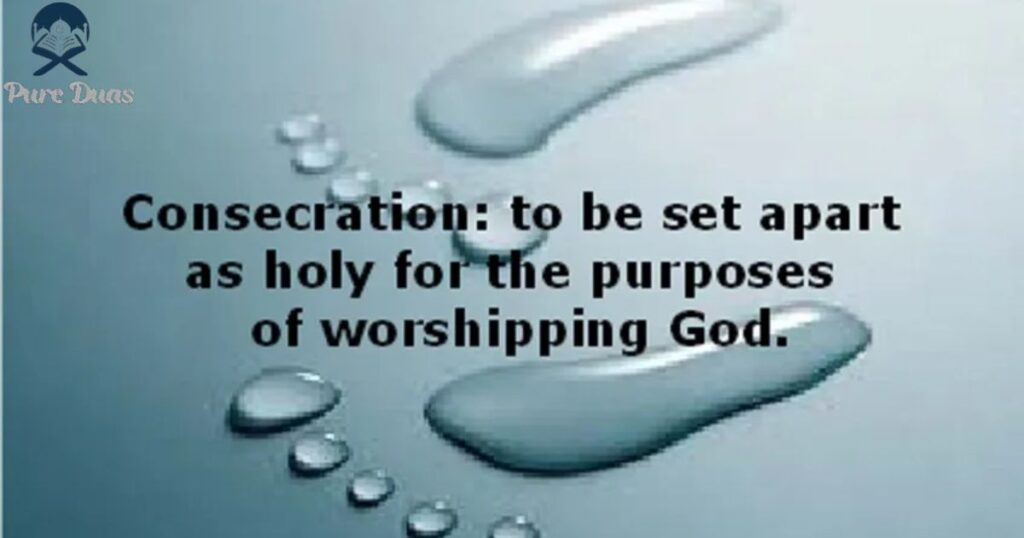Have you ever wondered what it truly means to be set apart from God? Throughout Scripture, consecration appears as a powerful thread connecting believers to divine purpose. This ancient practice is not just historical, it is deeply relevant today.
Consecration in the Bible represents complete dedication to God’s will. From Moses anointing Aaron as high priest to Jesus sanctifying Himself for humanity, biblical consecration transforms ordinary lives into extraordinary vessels for God’s glory.
Understanding what consecration means changes everything. It shifts our perspective from casual faith to intentional devotion. When we consecrate ourselves, we step into a sacred relationship where God’s presence becomes tangible and His purposes become clear.
This comprehensive guide explores consecration’s biblical foundations, practical applications, and promised blessings. You will discover how ancient practices translate into modern spiritual commitment and why this matters for your faith journey today.
What Is Consecration?

The Biblical Definition of Consecration
Biblical consecration means dedicating something or someone exclusively to God. The Hebrew word qadash and Greek word hagiazo both convey the concept of making holy or setting apart from common use.
When you consecrate something, you remove it from everyday purposes and reserve it for sacred use. A cup used in temple worship wasn’t for drinking water at home. A priest consecrated to God’s service couldn’t live like everyone else.
God consistently calls people, places, and objects to be holy, separated from the ordinary and devoted to divine purposes.
Consecration as Dedication to God
Consecration involves intentional surrender. You are not just acknowledging God’s existence; you are placing your entire life under His authority.
The process includes recognizing God’s ownership of everything, willingly submitting to His plans, removing barriers between you and holiness, and committing to ongoing obedience.
When the Israelites prepared to cross the Jordan River, Joshua commanded them: “Consecrate yourselves, for tomorrow the Lord will do amazing things among you” (Joshua 3:5). God’s miraculous work required their dedicated preparation.
Key Biblical Examples of Consecration
Consecrated People
The Priests of Israel received special consecration. In Exodus 28:41, God instructed Moses: “You shall anoint them and ordain them and consecrate them, that they may serve me as priests.”
Aaron and his sons underwent elaborate rituals. They washed completely, wore specific garments, and received anointing oil. Blood from sacrifices touched their ears, thumbs, and toes, symbolizing complete dedication of hearing, doing, and walking. These rituals demonstrated that serving God requires total transformation.
Jesus exemplified perfect consecration. In John 17:19, He prayed: “For them I sanctify myself, that they too may be truly sanctified.” Christ’s self-consecration enabled our redemption.
Consecrated Places
The Tabernacle required thorough consecration before use. Exodus 40:9-10 describes Moses anointing every part: “You shall take the anointing oil and anoint the tabernacle and all that is in it, and consecrate it and all its furniture, so that it may become holy.”
Every curtain, pole, and vessel needed dedication. God’s presence demanded purity. Nothing unholy could exist where the Holy One dwelled.
Consecrated Objects
Even inanimate objects received consecration. Priestly garments, altar tools, and worship instruments all underwent dedication rituals. The bronze altar, golden lampstand, and incense altar were all consecrated before use, teaching us that everything touching God’s service requires intentional setting apart.
Old Testament vs New Testament Understanding
Old Testament consecration focused heavily on external rituals: physical washing and cleansing, animal sacrifices and blood offerings, specific foods and abstinence periods, and ceremonial purification processes.
New Testament consecration emphasizes internal transformation: heart and mind renewal, faith in Christ’s finished work, spiritual commitment over ritual performance, and Holy Spirit empowerment.
Romans 12:1 captures this beautifully: “Offer your bodies as a living sacrifice, holy and pleasing to God, this is your true and proper worship.”
Paul is not asking for dead animals on altars. He’s calling for living, breathing dedication, your whole life consecrated daily.
| Aspect | Old Testament | New Testament |
| Focus | External rituals | Internal heart change |
| Method | Ceremonial washing | Spiritual renewal |
| Sacrifice | Animal offerings | Living dedication |
| Access | Through priests | Direct through Christ |
| Duration | Repeated ceremonies | Ongoing lifestyle |
How People Consecrated Themselves

Old Testament Consecration Practices
Physical Purification Rituals
Ancient Israelites followed detailed purification protocols. These were not arbitrary rules, they represented spiritual truths through physical actions.
Washing symbolized cleansing from sin. Before approaching God, people washed their clothes and bodies. This demonstrated reverence and recognition of God’s purity.
Dietary restrictions also played a role. During consecration periods, people avoided certain foods. This taught self-control and reminded them they were set apart.
Ceremonial Requirements
Sacrifices formed consecration’s core of consecration in the Old Testament. Blood offerings atoned for sin, creating the purity necessary to approach God.
Moses performing Aaron’s consecration provides a detailed example: washing at the tabernacle entrance, dressing in sacred priestly garments, anointing with holy oil, applying sacrificial blood to specific body parts, and seven days of consecration ceremonies.
New Testament Consecration: A Heart Transformation
The Shift to Spiritual Consecration
Everything changed with Jesus. His sacrifice fulfilled the ceremonial law, opening a new way to God.
Romans 12:1 introduces revolutionary thinking: “Present your bodies as a living sacrifice, holy and acceptable to God, which is your spiritual worship.”
You’re not bringing a lamb to an altar. You’re bringing yourself, alive, active, daily dedicated to God. This spiritual commitment runs deeper than any ritual. It transforms your thoughts, motivations, and choices.
Internal vs External Focus
Paul writes in Romans 12:2: “Do not be conformed to this world, but be transformed by the renewal of your mind.”
Mind renewal replaces ceremonial washing through meditating on God’s Word, prayer and communion with God, Holy Spirit guidance, and community with other believers.
Your heart and mind become the temple. God’s presence dwells within you through His Spirit.
Modern Application: Living a Consecrated Life Today
Daily Spiritual Practices
Commit to God Daily
Each morning presents a fresh opportunity for consecration. Start your day acknowledging God’s ownership of your life. Prayer is not just asking for things, it is surrendering control, seeking guidance, and aligning yourself with divine purposes.
Live According to His Word
The Bible is not just information, it is transformation. When Scripture shapes your thinking, consecration becomes natural. Obedience demonstrates genuine dedication. Jesus said: “If you love me, you will keep my commandments” (John 14:15).
This means making decisions based on biblical principles, choosing integrity even when costly, reflecting God’s character in relationships, and speaking truth with love.
Separate from Sin
Consecration requires boundaries. Paul urges: “Come out from among them and be separate, says the Lord” (2 Corinthians 6:17). This doesn’t mean isolation from non-believers. It means refusing to participate in things that dishonor God.
Use Your Gifts for God
Every talent, resource, and opportunity belongs to God. Consecrated believers steward these for kingdom purposes. Your time becomes God’s time. Your money becomes a kingdom investment. Your abilities become tools for His work.
This transforms ordinary activities into worship. Working with excellence honors God. Serving others demonstrates His love.
Trust in Jesus’ Sacrifice
Consecration isn’t about perfection, it is about surrender. You can not make yourself holy through effort alone. Christ’s sacrifice provides the righteousness you need.
2 Timothy 2:21 promises: “If anyone cleanses himself from what is dishonorable, he will be a vessel for honorable use, set apart as holy, useful to the master of the house, ready for every good work.”
Practical Steps for Believers
Create sacred time and space. Designate a place for prayer and Bible reading. Consistency builds spiritual momentum.
Practice fasting and focused prayer. Fasting reminds you that God matters more than physical needs. It sharpens spiritual sensitivity.
Regular self-examination. Ask the Holy Spirit to reveal areas needing surrender. Confession keeps your heart tender toward God.
Make covenant commitments. Write out your dedication to God. Review it regularly, renewing your consecration.
The Blessings of Consecration
Introduction to God’s Promises
Why consecrate yourself to God? Because dedication unlocks divine blessings. This is not a prosperity gospel, it is a biblical truth: God rewards those who earnestly seek Him.
Key Blessings Believers Receive

God’s Presence and Nearness
James 4:8 promises: “Draw near to God, and He will draw near to you.”
Consecration creates intimacy with God. You experience His presence tangibly, in prayer, worship, and daily life. This nearness brings peace during storms, wisdom for decisions, comfort in grief, and joy beyond circumstances.
Believers throughout history testify to this. Brother Lawrence practiced God’s presence while washing dishes. Hudson Taylor sensed God’s nearness in China’s hardships.
Spiritual Strength and Victory
2 Chronicles 16:9 declares: “For the eyes of the Lord range throughout the earth to strengthen those whose hearts are fully committed to Him.”
God actively seeks consecrated hearts to empower. When you are dedicated, He provides strength to resist temptation, courage to stand for truth, power to overcome obstacles, and victory in spiritual battles.
Paul writes in Philippians 4:13: “I can do all things through Christ who strengthens me.”
Spiritual Growth and Maturity
2 Timothy 2:21 explains: “Those who cleanse themselves will be instruments for special purposes, made holy, useful to the Master, and prepared to do any good work.”
Consecration accelerates spiritual development. As you separate from sin and dedicate yourself to God, you become more Christ-like in character, more effective in ministry, more fruitful in relationships, and more confident in faith.
Additional Blessings
Clear direction and purpose emerge when you’re consecrated. God reveals His plans to those who seek Him wholeheartedly.
Peace amid circumstances comes from knowing you are in God’s will. External chaos can not shake internal rest.
Fruitfulness in ministry multiplies when you’re set apart for God. He works through clean vessels.
Eternal rewards await those who live consecrated lives.
Blessings Comparison Table
| Blessing | Scripture | What It Means | How It Manifests |
| God’s Presence | James 4:8 | Divine nearness and fellowship | Peace, guidance, comfort |
| Strength & Victory | 2 Chronicles 16:9 | Power for committed hearts | Overcoming temptation, courage |
| Spiritual Growth | 2 Timothy 2:21 | Becoming useful instruments | Christ-like character, fruitfulness |
| Divine Purpose | Jeremiah 29:11 | Clear direction | Understanding your calling |
| Answered Prayer | John 15:7 | Access through abiding | Petitions aligned with God’s will |
The Cost and the Reward
Consecration costs something. Jesus warned: “Whoever does not take his cross and follow me is not worthy of me” (Matthew 10:38).
You might sacrifice comfortable sin patterns, worldly approval, selfish ambitions, and material pursuits.
But what you gain infinitely exceeds what you give up. Missionary Jim Elliot wrote before his martyrdom: “He is no fool who gives what he cannot keep to gain what he cannot lose.”
Consecrated living trades temporary pleasures for eternal treasures.
Conclusion
Consecration in the Bible represents complete dedication to God’s purposes. From Old Testament rituals involving priests and sacrifices to New Testament spiritual commitment, the core remains: being set apart for God.
Ancient Israelites consecrated through physical purification. Modern believers consecrate through heart and mind transformation. Both require intentional surrender and ongoing obedience.
The blessings of consecration are remarkable, God’s presence, spiritual strength, growth, and divine purpose flow to the dedicated. When you consecrate yourself, you experience God’s power working through your living sacrifice.
Start today. Commit to God daily. Separate from sin. Use your gifts for His glory. Trust Jesus’ sacrifice rather than your perfection. Biblical consecration is not an outdated tradition, it is a timeless truth.
Read Related Blogs: Interesting Facts About Peter from the Bible That Reveal His Remarkable Journey
Frequently Asked Questions
What does consecration mean in simple terms?
Consecration means dedicating yourself completely to God. It’s choosing to set apart your life for His purposes rather than living for yourself or worldly goals.
How is consecration different from sanctification?
Consecration is your act of dedication to God, while sanctification is God’s ongoing process of making you holy. Consecration initiates; sanctification transforms progressively.
Can I consecrate myself to God today?
Yes! Through prayer and commitment, you can consecrate yourself now. Simply surrender your life to God, confess any sin, and declare your dedication to His will.
What are examples of consecration in daily life?
Daily consecration includes morning prayer dedicating your day, using talents for God’s glory, practicing biblical obedience, serving others sacrificially, and making God-honoring decisions consistently.
Do Christians need to follow Old Testament consecration rituals?
No. Christ fulfilled ceremonial law. Modern consecration focuses on spiritual commitment, heart transformation, living sacrifice, and Holy Spirit empowerment rather than physical rituals and animal offerings.
